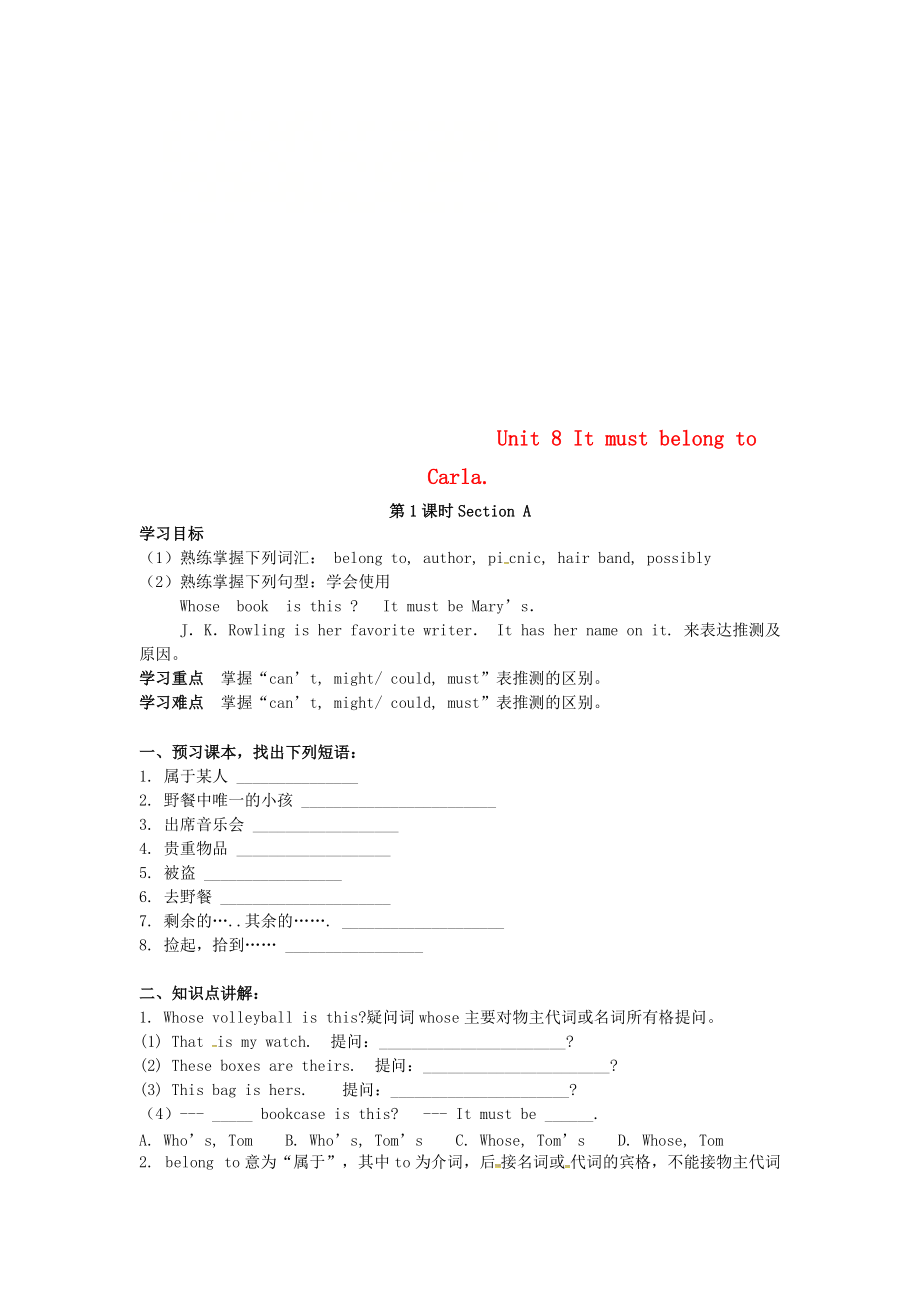《山西省運(yùn)城市垣曲縣九年級(jí)英語全冊(cè) Unit 8 It must belong to Carla第1課時(shí)學(xué)案無答案新版人教新目標(biāo)版》由會(huì)員分享,可在線閱讀����,更多相關(guān)《山西省運(yùn)城市垣曲縣九年級(jí)英語全冊(cè) Unit 8 It must belong to Carla第1課時(shí)學(xué)案無答案新版人教新目標(biāo)版(3頁(yè)珍藏版)》請(qǐng)?jiān)谘b配圖網(wǎng)上搜索。
1���、
Unit 8 It must belong to Carla.
第1課時(shí)Section A
學(xué)習(xí)目標(biāo)
(1)熟練掌握下列詞匯: belong to, author, picnic, hair band, possibly
(2)熟練掌握下列句型:學(xué)會(huì)使用
Whose book is this ? It must be Mary’s.
J.K.Rowling is her favorite writer. It has her name on it. 來表達(dá)推測(cè)及原因��。
學(xué)習(xí)重點(diǎn) 掌握“can’t, might/ could, must”表推測(cè)的
2、區(qū)別�����。
學(xué)習(xí)難點(diǎn) 掌握“can’t, might/ could, must”表推測(cè)的區(qū)別��。
一��、預(yù)習(xí)課本�,找出下列短語:
1. 屬于某人 _______________
2. 野餐中唯一的小孩 ________________________
3. 出席音樂會(huì) __________________
4. 貴重物品 ___________________
5. 被盜 _________________
6. 去野餐 _____________________
7. 剩余的…..其余的……. ____________________
8.
3、撿起����,拾到…… _________________
二、知識(shí)點(diǎn)講解:
1. Whose volleyball is this?疑問詞whose主要對(duì)物主代詞或名詞所有格提問�。
(1) That is my watch. 提問:_______________________?
(2) These boxes are theirs. 提問:_______________________?
(3) This bag is hers. 提問:______________________?
(4)--- _____ bookcase is this? --- It must
4、 be ______.
A. Who’s, Tom B. Who’s, Tom’s C. Whose, Tom’s D. Whose, Tom
2. belong to意為“屬于”,其中to為介詞�����,后接名詞或代詞的賓格�,不能接物主代詞和名詞所有格。be someone’s也表示“屬于某人”�,但其中有be動(dòng)詞,后面要接名詞所有格形式或名詞性物主代詞���。belong to不用于進(jìn)行時(shí)態(tài)和被動(dòng)語態(tài)
(1)This watch belongs to Tony. = This watch _______ _________.
(2)Whose volleyball is this
5�、?=Whose ?
= this volleyball belong to?
(3)I ’m a member of the swimming club.=I the swimming club.
3. 情態(tài)動(dòng)詞表示推測(cè):
(1) must表示對(duì)事情的推測(cè)把握比較大����,意為“肯定,一定”����,只用于肯定句,否定句中的推測(cè)用_____����。
(2) might強(qiáng)調(diào)將來或現(xiàn)在的可能性,表示推測(cè)的把握不大�����。
(3) could也可以用來表示現(xiàn)在的可能性,推測(cè)的把握比較小���。
(4) can’t表示否定的
6�����、推測(cè)����,意為“不可能”�,把握較大�。
【特別提示】 情態(tài)動(dòng)詞表推測(cè)時(shí),用不同的形式表示不同的時(shí)態(tài)�����。表示對(duì)現(xiàn)在情況的推測(cè)用“情態(tài)動(dòng)詞+do”��;表示對(duì)正在發(fā)生的事情的推測(cè)“情態(tài)動(dòng)詞+be doing”�;表示對(duì)過去或已完成事情的推測(cè)用“情態(tài)動(dòng)詞+have done”。
(1). You ______ be hungry after the long walk. Help yourself to some cakes.
A. can’t B. shouldn’t C. need D. must
(2). --- Look! Mr. Wang is standing und
7�����、er the tree.
--- It _____ be Mr. Wang. He has gone to Shanghai.
A. mustn’t B. must C. can’t D. needn’t
(3). --- Is John coming by train?
--- He should, but he _____ not. He likes driving his car.
A. may B. must C. can D. Need
三、學(xué)以致用:(每題3分)
1. 我昨天參加了音樂會(huì)��,所以它可能仍然在音樂
8���、廳���。
I __________ a concert yesterday, so it _________ still ________ in the music hall.
2. 我記得在野餐時(shí)我?guī)Я藭?
I remember I ________ my schoolbag _________ me ________ the ________.
3. 你可能正確,但是我不確定����。
You ________ ________ right, but I’m not sure.
4. The man outside the door must be Mr. Green. (改為否定句)
9、
The man outside the door ______ ______ Mr. Green.
5. This could be Robert’s basketball. (劃線提問)
_________ basketball ________ this be?
6. Do you know whose book is this?
= Do you know _________ the book _________ _______?
7. This red bike must ______ Mary. She rides it to school every day
10��、.
A. send to B. have to C. belong to D. go to
8. --- Tom, where is your father? --- I’m not sure. He ______ in his office.
A. is B. may be C. maybe D. may
6EDBC3191F2351DD815FF33D4435F3756EDBC3191F2351DD815FF33D4435F3756EDBC3191F2351DD815FF33D4435F3756EDBC3191F2351DD815FF33D4435F3756EDBC3191F2351DD815FF33D4435F3756EDBC3191F2351DD815FF33D4435F375
 山西省運(yùn)城市垣曲縣九年級(jí)英語全冊(cè) Unit 8 It must belong to Carla第1課時(shí)學(xué)案無答案新版人教新目標(biāo)版
山西省運(yùn)城市垣曲縣九年級(jí)英語全冊(cè) Unit 8 It must belong to Carla第1課時(shí)學(xué)案無答案新版人教新目標(biāo)版

